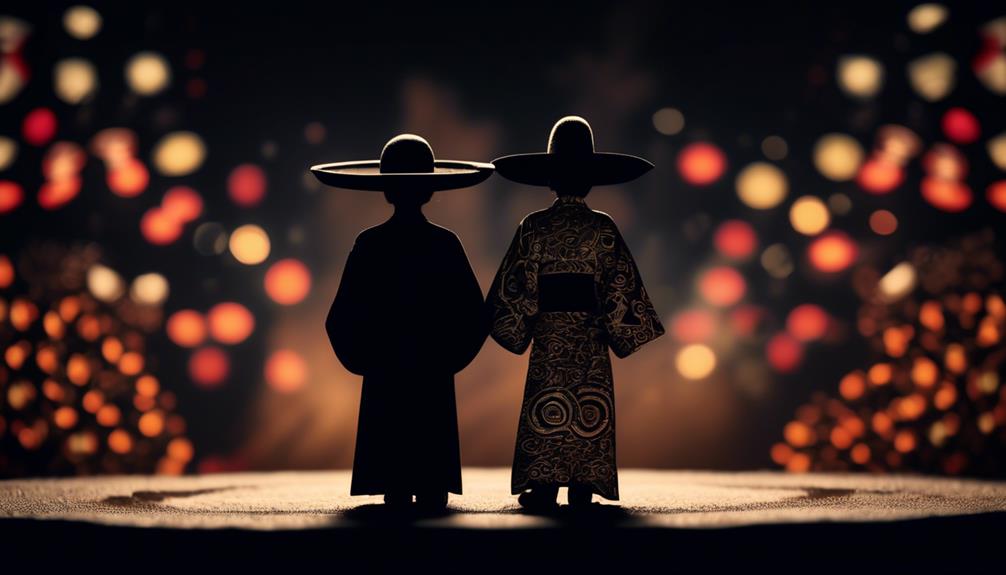What Is the Influence of Cultural Stereotypes on Love?

Cultural stereotypes have a significant impact on love. They shape our expectations, roles, and attractions, and influence the way we navigate romantic relationships.
These stereotypes are often deeply ingrained in society and can be perpetuated through media, education, and socialization. They can create pressure to conform to certain ideals and can limit our understanding of love and relationships.
For example, cultural stereotypes may dictate that men should be strong and unemotional, while women should be nurturing and submissive. These expectations can lead to misunderstandings and conflicts in relationships, as individuals may feel pressured to conform to these stereotypes rather than express their true selves.
Moreover, cultural stereotypes can influence our attractions. We may be attracted to certain individuals based on preconceived notions about their cultural backgrounds or ethnicities. This can lead to objectification or fetishization of individuals, rather than seeing them as complex individuals with unique personalities and experiences.
Overall, cultural stereotypes have a profound impact on love and relationships. It is important to challenge and question these stereotypes in order to foster healthier and more inclusive understandings of love.
Origins of Cultural Stereotypes
The origins of cultural stereotypes can be traced back to a complex interplay of historical events, societal structures, and human psychology. Cultural stereotypes are often perpetuated through various mediums, including the media and education systems.
In the media, stereotypes are often portrayed as a way to simplify complex cultural identities, creating easily recognizable characters that fit into preconceived notions. This perpetuates the cycle of stereotypes and reinforces biased perspectives.
Additionally, education plays a significant role in the perpetuation of stereotypes. The curriculum and teaching materials used in schools often present cultural stereotypes as truths, leading students to internalize these biases. By presenting a narrow and distorted view of different cultures, education systems contribute to the perpetuation of harmful stereotypes.
This not only limits the understanding and appreciation of diverse cultures but also reinforces discriminatory attitudes and behaviors. To combat the perpetuation of cultural stereotypes, it's crucial to critically analyze the media we consume and actively challenge the biases embedded within our education systems.
Stereotypes' Impact on Relationship Expectations
When it comes to relationship expectations, stereotypes play a significant role in shaping our ideals. Society often idealizes certain types of relationships based on cultural stereotypes, leading to unrealistic expectations.
These stereotypes can also influence how we communicate and interact with our partners, perpetuating misunderstandings and conflict.
It's important to recognize the impact of stereotypes on our relationship expectations and strive for a more realistic and open-minded approach.
Relationship Idealization and Stereotypes
Stereotypes exert a powerful influence on our expectations of relationships, shaping our idealized notions of love and creating unrealistic standards. Cultural conditioning plays a significant role in this process, as societal norms and beliefs are deeply ingrained within us.
We're constantly bombarded with images and narratives that perpetuate certain stereotypes about love and relationships. These stereotypes often depict a specific ideal that's unattainable and unrealistic. They can lead to dissatisfaction and disappointment when our relationships fail to meet these lofty expectations.
The media, in particular, plays a significant role in perpetuating these stereotypes, presenting us with an idealized version of love that's far from the messy reality of human relationships.
It's important to recognize the influence of stereotypes on our relationship expectations and strive for a more realistic and authentic understanding of love.
Cultural Expectations and Love
Our deeply ingrained cultural conditioning shapes our expectations of love, perpetuating stereotypes that create unrealistic relationship ideals. Cultural norms play a significant role in influencing our perception of what love should look like.
Here are three ways cultural expectations impact our understanding of love and relationships:
- Gender Roles: Cultural norms often dictate specific gender roles within relationships, reinforcing stereotypes that can limit individual expression and fulfillment. These expectations may place unnecessary pressure on individuals to conform to traditional gender roles, leading to dissatisfaction and inequality within relationships.
- Communication Styles: Different cultures have distinct communication styles, which can lead to misunderstandings and misinterpretations in cross-cultural relationships. Miscommunication can create barriers and result in conflict or resentment, highlighting the need for effective communication strategies that bridge cultural differences.
- Relationship Milestones: Cultural expectations often dictate the timeline and milestones of a relationship, such as marriage or starting a family. These expectations can create pressure and anxiety for individuals who may not align with these cultural norms, leading to feelings of inadequacy or failure.
Navigating cultural expectations requires open-mindedness, respect, and a willingness to challenge societal stereotypes. By understanding and appreciating the diverse perspectives within cross-cultural relationships, we can foster healthier and more inclusive notions of love.
Stereotypes' Influence on Communication
Communication in relationships is heavily influenced by cultural stereotypes, shaping our expectations and creating potential barriers to understanding.
Cross-cultural misunderstandings can arise when individuals rely on preconceived notions and assumptions about people from different cultures. Stereotypes can lead to misinterpretations and misunderstandings, as they limit our ability to truly understand and connect with others.
This is particularly evident in online dating, where stereotypes can play a significant role in shaping our perceptions of potential partners. People may make assumptions based on cultural stereotypes, leading to biased judgments and missed opportunities for meaningful connections.
It's essential to challenge these stereotypes and approach communication with an open mind and a willingness to learn and understand others on an individual level, rather than relying on generalized assumptions.
Stereotypes' Influence on Gender Roles in Love
Gender roles in love are deeply influenced by cultural stereotypes. These stereotypes shape our expectations and behaviors in relationships, often perpetuating gender biases and reinforcing societal norms. Here are three key ways in which stereotypes impact gender roles in love:
- Expectations of masculinity and femininity: Cultural stereotypes dictate that men should be strong, dominant, and independent, while women should be nurturing, submissive, and emotional. These expectations can limit individuals' expression of their true selves and create pressure to conform to societal norms.
- Division of labor: Stereotypes often assign specific tasks and responsibilities based on gender. Men are expected to be the breadwinners, while women are expected to take care of the household and children. This division of labor can create inequality and hinder the development of equitable partnerships.
- Emotional expression: Stereotypes also influence how men and women are expected to express their emotions. Men are often discouraged from showing vulnerability or sensitivity, while women are expected to be more emotionally open. This can result in emotional disconnect and hinder effective communication in relationships.
It is crucial to challenge these stereotypes and embrace a more inclusive and equal understanding of gender roles in love. By breaking free from these cultural biases, we can create healthier and more fulfilling relationships for everyone involved.
Cultural Stereotypes and Attraction
You've probably heard it before – that certain cultures have specific preferences when it comes to romantic partners. But have you ever stopped to think about why?
Cultural stereotypes play a significant role in shaping our romantic preferences, whether we realize it or not. From the media we consume to societal expectations, we're conditioned to find certain traits attractive and others less so.
These stereotypes not only impact our personal preferences but also influence the dynamics within our relationships.
Stereotypes and Romantic Preferences
Are cultural stereotypes influencing your romantic preferences? It's a controversial question, but one that needs to be addressed. Stereotypes and preferences go hand in hand, as societal expectations often shape the way we perceive and pursue romantic relationships.
Here are three ways in which cultural stereotypes can influence your romantic preferences:
- Media Influence: The media bombards us with images and narratives that reinforce cultural stereotypes. From romantic comedies to dating shows, these portrayals can shape our ideas of what's desirable and acceptable in a partner.
- Family and Peer Pressure: Our families and friends often have their own set of expectations and beliefs when it comes to romantic relationships. These influences can make us feel pressured to adhere to certain stereotypes or preferences, even if they don't align with our own desires.
- Unconscious Bias: We all have unconscious biases that can impact our romantic preferences. These biases are often shaped by cultural stereotypes and can lead us to make choices based on assumptions rather than genuine connection.
It's important to recognize and challenge these influences to ensure that our romantic preferences are based on our own individual desires and values, rather than societal expectations.
Cultural Conditioning and Attraction
Cultural conditioning shapes our attraction patterns through the reinforcement of stereotypes and societal expectations. These cultural norms dictate what is considered attractive and desirable in a romantic partner. From an early age, we are bombarded with messages about what a "perfect" partner should be like based on our culture's ideals. This cultural conditioning influences our preferences, leading us to seek out partners who fit these predetermined molds. However, blindly adhering to these cultural expectations can be detrimental to our relationship satisfaction. It is important to recognize that cultural compatibility does not guarantee a successful relationship. True compatibility goes beyond superficial factors and requires a deeper understanding and connection. By breaking free from cultural stereotypes and embracing individuality, we can find greater fulfillment in our relationships.
| Cultural Norms and Romantic Compatibility | Cultural Expectations and Relationship Satisfaction |
|---|---|
| Cultural norms influence our expectations of what makes a compatible partner. | Adhering to cultural expectations can lead to dissatisfaction in relationships. |
| Cultural compatibility does not guarantee a successful relationship. | Breaking free from cultural stereotypes can lead to greater relationship satisfaction. |
| Embracing individuality and understanding are key to finding fulfillment in relationships. | True compatibility goes beyond superficial factors dictated by cultural norms. |
Impact on Relationship Dynamics
Stereotypes based on cultural backgrounds can significantly impact the dynamics of a relationship. Here are three key ways in which cultural stereotypes can influence your relationship:
- Impact on emotional intimacy: Cultural stereotypes can create barriers to emotional intimacy by perpetuating certain expectations or beliefs about how individuals from different backgrounds should express their emotions. These stereotypes can lead to misunderstandings and hinder the development of deep emotional connections.
- Stereotypes' influence on commitment: Cultural stereotypes can also affect the level of commitment in a relationship. For example, certain stereotypes may suggest that individuals from a particular culture are more inclined to be unfaithful or less committed to a long-term relationship. These assumptions can lead to doubts and insecurities, potentially impacting the overall stability of the relationship.
- Power dynamics and gender roles: Cultural stereotypes often come with ingrained notions of power dynamics and gender roles. These stereotypes can shape expectations within a relationship, influencing how responsibilities are divided or how decisions are made. This can lead to unequal power dynamics and may hinder the establishment of a healthy and balanced partnership.
It is important to recognize and challenge these stereotypes in order to foster a more inclusive and fulfilling relationship.
Stereotypes' Effect on Intercultural Relationships
Intercultural relationships are inevitably influenced by preconceived notions and biases. These stereotypes can have a significant impact on both the emotional connection and long-term commitment between partners. Let's dive deeper into how these stereotypes affect intercultural relationships.
| Stereotype | Effect on Emotional Connection | Effect on Long-Term Commitment |
|---|---|---|
| Stereotype 1 | Creates barriers to understanding and empathy | Can lead to doubts and insecurities |
| Stereotype 2 | Undermines trust and communication | Hinders future planning and shared goals |
| Stereotype 3 | Reinforces power dynamics and inequality | Increases likelihood of cultural clashes |
Stereotypes can hinder the emotional connection between partners, as they create barriers to understanding and empathy. When partners hold preconceived notions about each other's cultures, it becomes difficult to truly connect on a deep emotional level.
Moreover, stereotypes can also impact long-term commitment. They undermine trust and communication, which are vital for a healthy and committed relationship. Doubts and insecurities can arise when stereotypes are perpetuated, leading to a lack of faith in the relationship's future.
Additionally, stereotypes reinforce power dynamics and inequality within intercultural relationships. This can result in cultural clashes and difficulties in finding common ground. It becomes harder to envision a shared future and create a sense of unity when stereotypes are at play.
Stereotypes' Role in Communication and Conflict Resolution
Preconceived notions and biases regarding cultural backgrounds significantly influence communication and conflict resolution in intercultural relationships. Here are three ways in which stereotypes play a role in these aspects:
- Misinterpretation of intentions: Stereotypes often lead to miscommunication, as individuals may attribute certain behaviors or statements to their partner's cultural background rather than considering their unique personality and perspective. This can result in misunderstandings, hurt feelings, and escalated conflicts.
- Assumptions about communication styles: Stereotypes can influence how individuals perceive and interpret verbal and nonverbal communication. For example, assuming that someone from a particular culture is more aggressive or confrontational may lead to defensive responses or avoidance of conflict resolution. These assumptions can hinder effective communication and prevent the resolution of conflicts.
- Bias in conflict resolution strategies: Stereotypes can impact the way individuals approach conflict resolution. People may rely on cultural stereotypes to determine what strategies are appropriate or effective. This can lead to the dismissal of certain conflict resolution techniques, limiting the options available for resolving issues and potentially perpetuating unresolved conflicts.
Understanding and challenging these stereotypes is crucial for fostering effective communication and conflict resolution in intercultural relationships. By recognizing the limitations of stereotypes and embracing open-mindedness, individuals can work towards more constructive and inclusive approaches to resolving conflicts and strengthening their relationships.
Breaking Free From Cultural Stereotypes in Love
While stereotypes may heavily influence communication and conflict resolution in intercultural relationships, it is imperative to break free from these cultural biases when it comes to matters of love. Cultural stereotypes can create unnecessary barriers and hinder the growth and understanding of a relationship. Breaking free from these stereotypes is essential to fostering a healthy and genuine connection with your partner.
To illustrate the importance of breaking free from cultural barriers, let's examine a table that highlights common stereotypes and the corresponding negative impact they can have on relationships:
| Stereotype | Negative Impact |
|---|---|
| All Asians are submissive | Assumes power dynamics |
| Latinas are fiery and passionate | Oversimplifies emotions |
| African-Americans are aggressive | Encourages racial bias |
| Europeans are sophisticated | Ignores individuality |
Embracing Cultural Diversity in Romantic Relationships
Embracing cultural diversity in romantic relationships is crucial for breaking down barriers and fostering genuine connections. In a world that's becoming increasingly interconnected, it's important to acknowledge and celebrate the richness of different cultures. Here are three reasons why embracing diversity and cultural understanding in romantic relationships is essential:
- Broadening your perspective: When you embrace cultural diversity, you open yourself up to new experiences and perspectives. This can expand your understanding of the world and help you see things from different angles. By being in a relationship with someone from a different culture, you have the opportunity to learn about their traditions, customs, and values, which can enrich your own life.
- Breaking down stereotypes: Cultural stereotypes can be limiting and create misconceptions about certain groups of people. By embracing diversity in your romantic relationships, you challenge these stereotypes and show that love knows no boundaries. This can help break down societal barriers and promote equality and understanding.
- Building stronger connections: Embracing cultural diversity can lead to stronger and more meaningful connections in romantic relationships. When you truly understand and appreciate someone's culture, you're better equipped to communicate and connect with them on a deeper level. This fosters a sense of mutual respect, trust, and appreciation, which can ultimately strengthen the bond between partners.
Frequently Asked Questions
How Do Cultural Stereotypes in Love Relationships Affect Individuals' Self-Esteem?
Cultural stereotypes in love relationships can seriously affect your self-esteem. The impact of these stereotypes on relationship dynamics and the formation of romantic preferences can lead to feelings of inadequacy and pressure to conform.
What Are Some Common Misconceptions About Gender Roles in Romantic Relationships Influenced by Cultural Stereotypes?
You've got it all wrong! Common misconceptions about gender roles in romantic relationships are heavily influenced by cultural stereotypes. These harmful stereotypes have a detrimental effect on self-esteem.
Are There Any Positive Aspects of Cultural Stereotypes in Love Relationships?
Positive effects of cultural stereotypes in love relationships include fostering cultural understanding and appreciation. They can provide a framework for people to navigate cultural differences and learn from each other's traditions and customs.
How Do Cultural Stereotypes Impact the Way People Express Affection in Different Cultures?
In different cultures, cultural stereotypes heavily influence the way people express affection. For example, in some cultures, public displays of affection are frowned upon, leading to suppressed romantic gestures and unfulfilled expectations.
Can Breaking Free From Cultural Stereotypes in Love Relationships Lead to Cultural Assimilation?
Breaking free from cultural stereotypes in love relationships can lead to cultural assimilation. By challenging preconceived notions and embracing new perspectives, individuals can form deeper connections and foster a more inclusive society.











